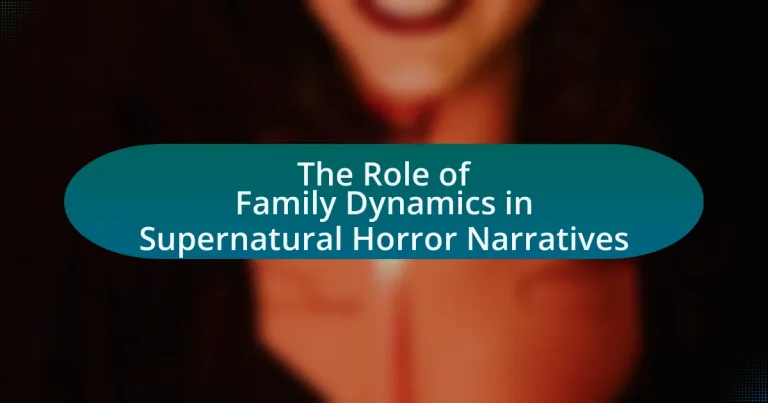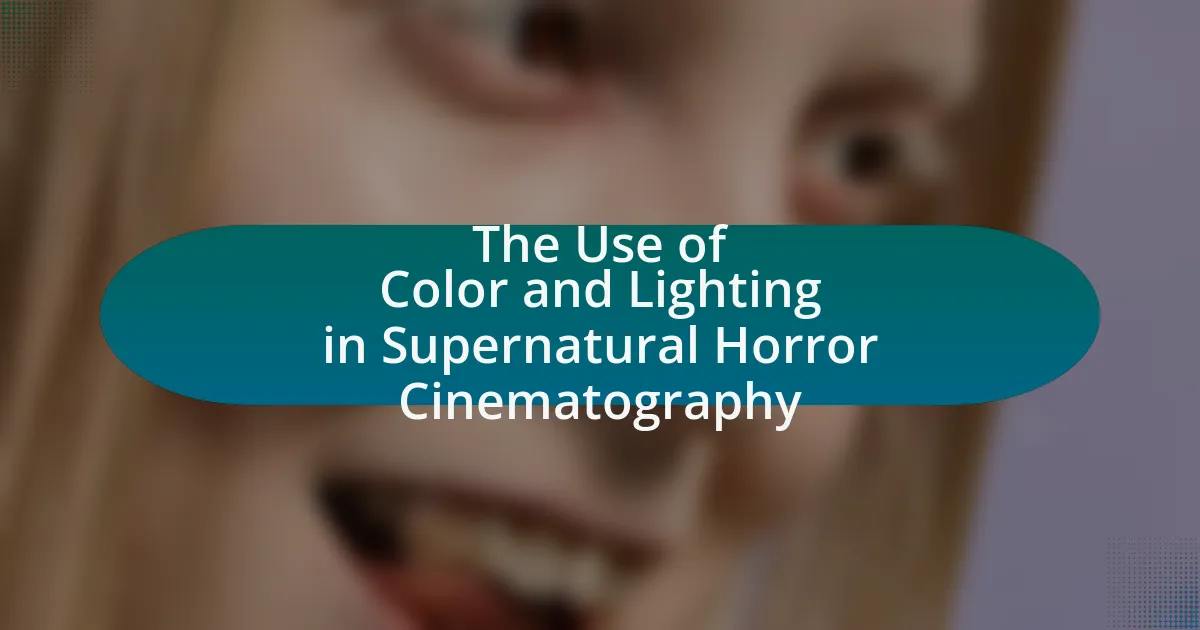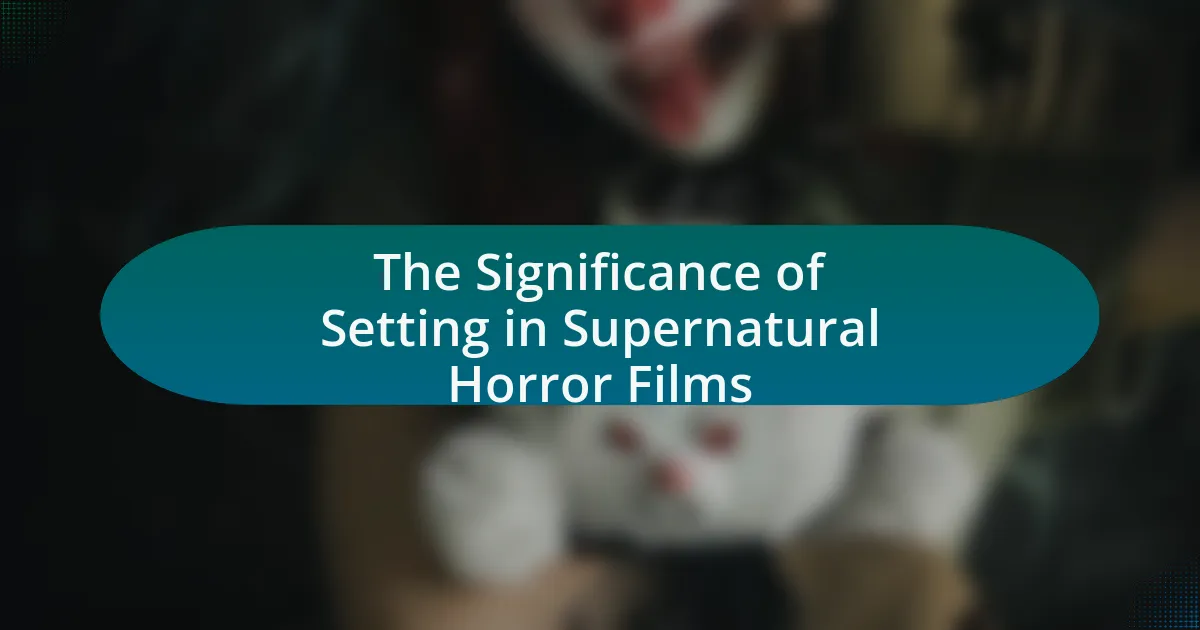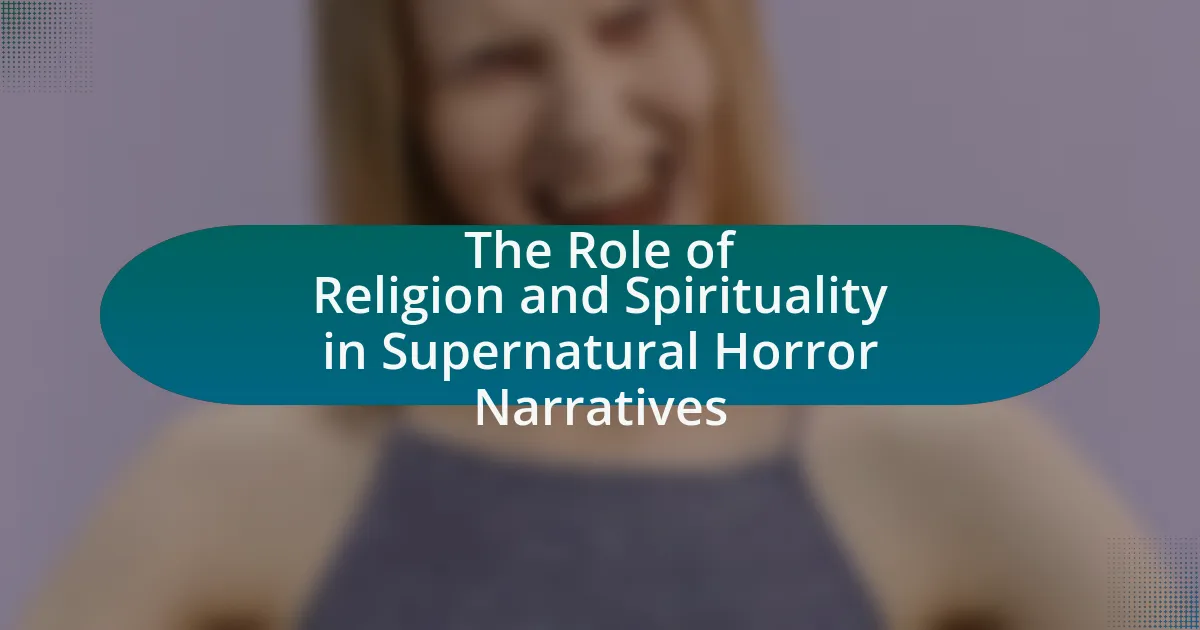The article examines the role of family dynamics in supernatural horror narratives, highlighting how complex relationships among family members are influenced by external supernatural forces. It explores themes such as trust, betrayal, and the psychological impact of fear on familial bonds, using examples from films like “Hereditary” and “The Shining.” The discussion includes the influence of different family structures, the significance of sibling relationships, and the effects of generational trauma and unresolved family issues on the narrative. Additionally, it analyzes how conflicts within families enhance horror elements and the consequences of betrayal, providing insights into the emotional stakes and character motivations in these narratives.
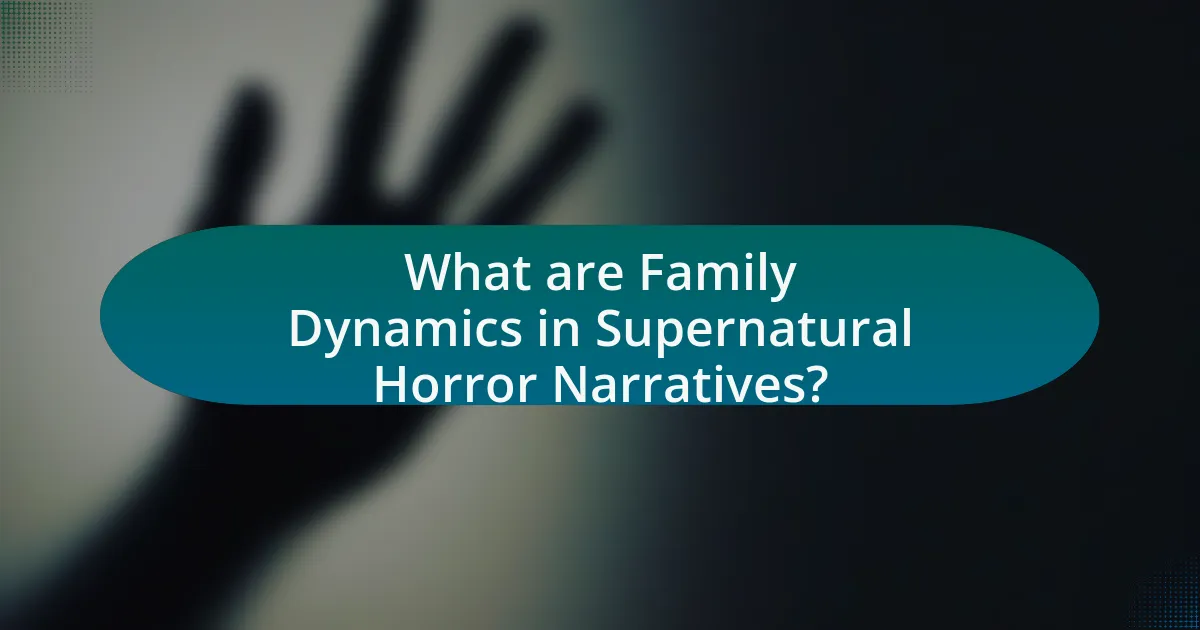
What are Family Dynamics in Supernatural Horror Narratives?
Family dynamics in supernatural horror narratives refer to the complex relationships and interactions among family members that are often influenced by external supernatural forces. These narratives typically explore themes of trust, betrayal, and the impact of fear on familial bonds, showcasing how characters respond to threats that challenge their unity. For instance, in films like “Hereditary,” the unraveling of family ties under the pressure of supernatural events highlights the fragility of relationships and the psychological strain that such experiences impose. This interplay between family dynamics and supernatural elements serves to amplify tension and drive the narrative forward, illustrating how familial connections can be both a source of strength and vulnerability in the face of horror.
How do family relationships influence the themes in supernatural horror?
Family relationships significantly influence the themes in supernatural horror by creating tension, conflict, and emotional stakes that heighten the narrative’s impact. The dynamics within families often serve as a microcosm for broader societal fears, such as loss, betrayal, and the unknown. For instance, in films like “Hereditary,” the breakdown of familial bonds amidst supernatural occurrences amplifies themes of grief and trauma, illustrating how unresolved family issues can manifest as horror. Additionally, the presence of generational curses or inherited trauma in stories like “The Shining” underscores the idea that family legacies can haunt individuals, both literally and metaphorically. This interplay between family dynamics and supernatural elements deepens the emotional resonance of the horror, making the themes more relatable and unsettling.
What specific family roles are commonly depicted in these narratives?
Common family roles depicted in supernatural horror narratives include the protective parent, the rebellious child, the estranged sibling, and the innocent victim. These roles often serve to highlight the dynamics of fear, loyalty, and betrayal within the family unit. For instance, the protective parent frequently embodies the struggle to safeguard their family from external threats, while the rebellious child often challenges authority, leading to conflict. The estranged sibling may represent unresolved tensions and past traumas, contributing to the narrative’s emotional depth. The innocent victim role emphasizes vulnerability, often eliciting sympathy from the audience. These roles are essential in driving the plot and enhancing the horror elements by showcasing how familial relationships can be both a source of strength and a catalyst for terror.
How do conflicts within families enhance the horror elements?
Conflicts within families enhance horror elements by creating a sense of betrayal and mistrust, which intensifies the emotional stakes of supernatural narratives. When family members turn against each other, it disrupts the foundational bonds of loyalty and safety, making the environment feel more threatening. For instance, in films like “Hereditary,” the unraveling family dynamics lead to paranoia and fear, as characters grapple with both external supernatural forces and internal familial strife. This duality amplifies tension, as the audience witnesses not only the horror of the supernatural but also the horror of human relationships breaking down. Such conflicts often serve as a catalyst for the unfolding terror, illustrating how the most frightening monsters can sometimes be those within our own families.
Why are families often central to supernatural horror stories?
Families are often central to supernatural horror stories because they embody the core themes of trust, betrayal, and the fragility of human relationships. In these narratives, familial bonds are tested by external supernatural forces, which heightens the emotional stakes and creates a sense of vulnerability. For instance, the horror genre frequently explores the idea that the home, typically a symbol of safety, can become a site of terror when family members are threatened by malevolent entities. This dynamic is evident in works like “The Shining” by Stephen King, where the family unit is both a source of strength and a target for supernatural disruption. The tension between familial loyalty and the threat of supernatural evil amplifies the horror experience, making families a focal point in these stories.
What psychological aspects of family dynamics contribute to fear?
Psychological aspects of family dynamics that contribute to fear include unresolved conflicts, power imbalances, and emotional neglect. Unresolved conflicts within a family can create an atmosphere of tension and anxiety, leading to fear of confrontation or rejection. Power imbalances, such as authoritarian parenting styles, can instill fear in children, making them feel powerless and vulnerable. Emotional neglect, where family members fail to provide adequate emotional support, can lead to feelings of abandonment and insecurity, further amplifying fear. Research indicates that these dynamics can significantly impact an individual’s mental health, contributing to anxiety disorders and phobias, as highlighted in studies by the American Psychological Association.
How do familial bonds create tension in supernatural horror?
Familial bonds create tension in supernatural horror by highlighting the conflict between love and fear within family relationships. These bonds often serve as a source of vulnerability, where the emotional stakes are high, leading to intense psychological struggles when supernatural elements threaten the family unit. For instance, in films like “Hereditary,” the unraveling of familial ties amidst supernatural occurrences amplifies the horror, as characters grapple with betrayal, grief, and the fear of losing loved ones to malevolent forces. This dynamic illustrates how the very connections that should provide safety can instead become a source of dread, as the supernatural exploits these relationships to create chaos and fear.
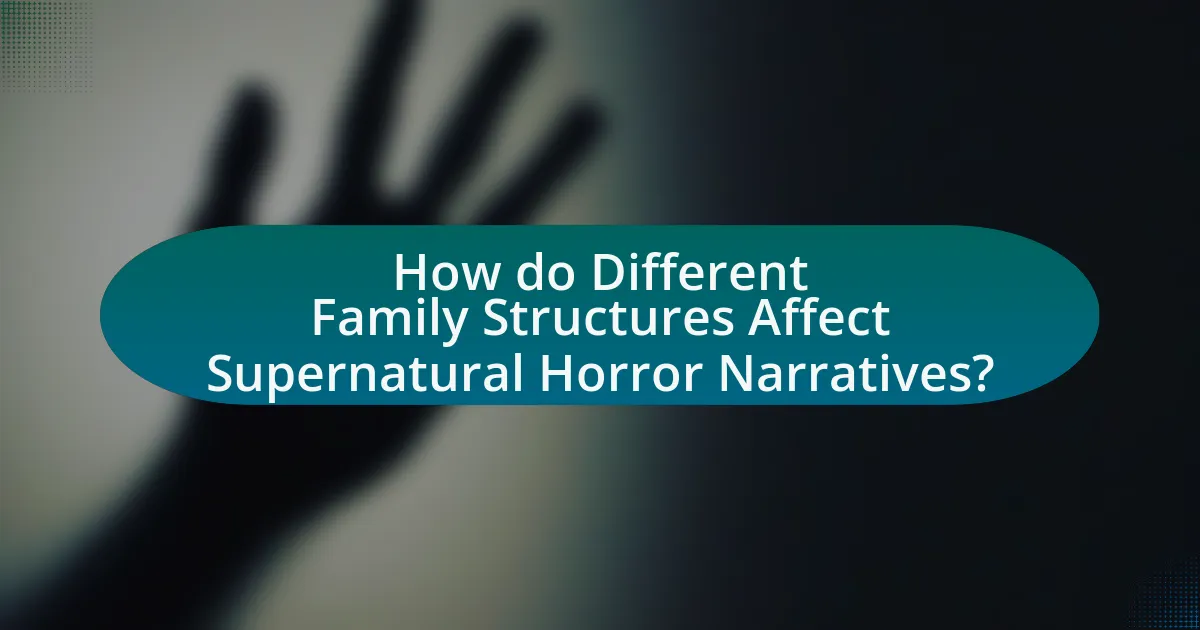
How do Different Family Structures Affect Supernatural Horror Narratives?
Different family structures significantly influence supernatural horror narratives by shaping character dynamics, motivations, and the manifestation of fear. For instance, nuclear families often depict a tight-knit unit facing external supernatural threats, which can amplify tension and highlight themes of protection and loyalty. In contrast, single-parent families may explore themes of vulnerability and isolation, as seen in films like “The Babadook,” where the mother’s struggles with grief and her child’s fears intertwine with supernatural elements. Extended families can introduce complex relationships and generational conflicts, as illustrated in “Hereditary,” where family secrets and inherited trauma become central to the horror. These variations in family structures not only affect character development but also dictate the narrative’s emotional depth and the nature of the supernatural threats encountered.
What impact do single-parent families have on horror storytelling?
Single-parent families significantly influence horror storytelling by introducing themes of isolation, vulnerability, and the struggle for survival. These narratives often depict the challenges faced by single parents, such as financial instability and emotional distress, which can heighten the sense of fear and tension. For instance, films like “The Babadook” illustrate how a single mother’s grief and struggles with parenting amplify the horror elements, making the supernatural threats more personal and relatable. This dynamic not only deepens character development but also reflects societal fears surrounding family structures, thereby enriching the horror genre with complex emotional layers.
How does the absence of a traditional family unit influence character development?
The absence of a traditional family unit significantly influences character development by fostering independence and resilience in individuals. Characters raised without conventional familial support often exhibit traits such as adaptability and resourcefulness, as they must navigate challenges on their own. Research indicates that children from non-traditional family structures may develop a heightened sense of self-reliance, which can lead to complex character arcs in narratives. For instance, studies show that individuals from single-parent or non-nuclear families often face unique social and emotional challenges, shaping their identities and moral frameworks in distinct ways. This dynamic is particularly evident in supernatural horror narratives, where characters may confront external threats while grappling with internal conflicts stemming from their familial backgrounds.
What role do extended families play in creating a sense of community or isolation?
Extended families play a significant role in creating a sense of community by providing emotional support, shared resources, and collective identity, while they can also lead to isolation through familial conflicts and pressure. The presence of extended family members often fosters a network of relationships that enhances social cohesion, as seen in cultures where family ties are emphasized, leading to increased feelings of belonging and security. Conversely, when extended families experience dysfunction or conflict, individuals may feel trapped or isolated due to familial obligations or expectations, which can hinder personal autonomy and create emotional distance. Research indicates that the dynamics within extended families can significantly influence individual well-being, highlighting the dual potential for both community and isolation.
How do sibling relationships shape the narrative in supernatural horror?
Sibling relationships significantly shape the narrative in supernatural horror by creating complex emotional dynamics that drive conflict and character development. These relationships often serve as a catalyst for the unfolding of supernatural events, as siblings may share secrets, fears, or traumas that manifest in haunting experiences. For instance, in films like “The Shining,” the bond between siblings is tested by external supernatural forces, leading to psychological unraveling and heightened tension. This dynamic not only enhances the horror elements but also deepens the narrative by exploring themes of loyalty, betrayal, and the impact of familial bonds on individual psyche.
What dynamics exist between siblings that can amplify horror themes?
Sibling dynamics that can amplify horror themes include rivalry, betrayal, and protective instincts. Rivalry often leads to jealousy and competition, creating tension that can escalate into fear or violence, as seen in narratives like “The Shining,” where sibling rivalry contributes to the unraveling of familial bonds. Betrayal can manifest in secrets or actions that undermine trust, heightening suspense and emotional stakes, exemplified in stories like “The Others,” where hidden truths between siblings drive the horror. Protective instincts can also turn sinister, as siblings may feel compelled to protect one another at any cost, leading to morally ambiguous decisions that intensify the horror experience, as illustrated in “The Conjuring.” These dynamics create a complex emotional landscape that enhances the overall impact of horror narratives.
How do sibling rivalries contribute to the plot in supernatural horror narratives?
Sibling rivalries significantly contribute to the plot in supernatural horror narratives by intensifying conflict and driving character motivations. These rivalries often manifest as competition for parental approval, inheritance, or power, which can lead to betrayal and heightened tension. For instance, in narratives like “The Shining,” the rivalry between siblings exacerbates the psychological horror, as their relationships become strained under supernatural influences. This dynamic not only creates a sense of urgency but also deepens the emotional stakes, making the horror more impactful. The presence of sibling rivalry serves as a catalyst for supernatural events, illustrating how familial tensions can unleash darker forces, ultimately shaping the narrative’s trajectory.
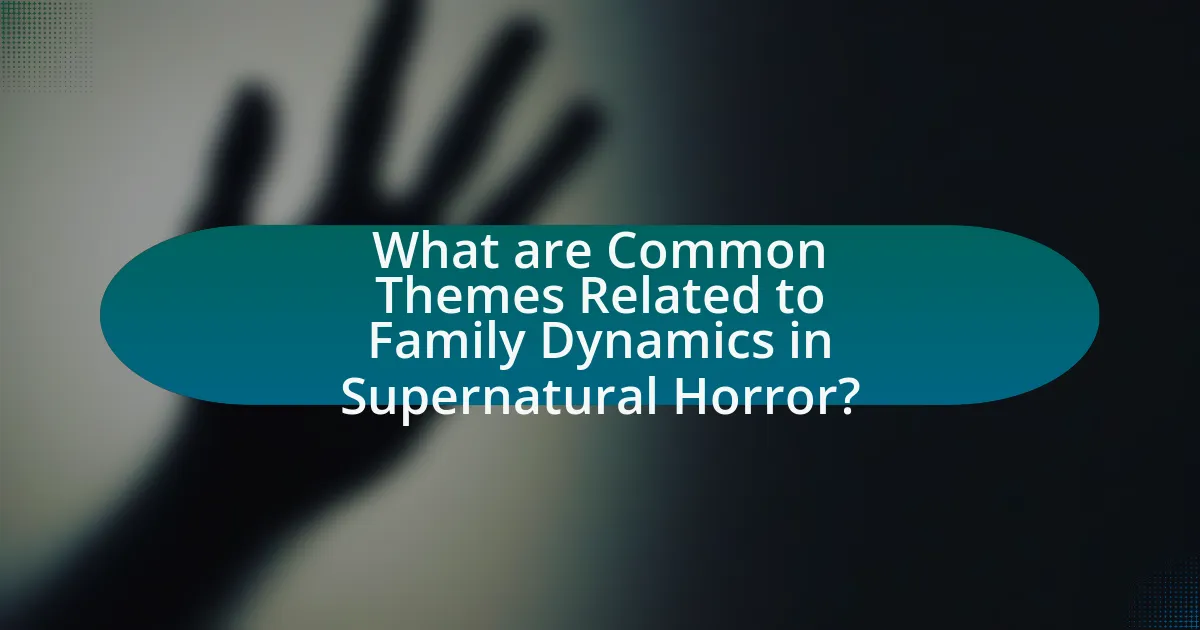
What are Common Themes Related to Family Dynamics in Supernatural Horror?
Common themes related to family dynamics in supernatural horror include betrayal, generational trauma, and the struggle for power. These themes often manifest through conflicts between family members, where supernatural elements amplify existing tensions. For instance, betrayal can occur when a family member is possessed or influenced by malevolent forces, leading to a breakdown of trust. Generational trauma is frequently depicted through inherited fears or curses that affect multiple family members across generations, illustrating how past actions haunt the present. The struggle for power is evident in family hierarchies, where supernatural abilities or knowledge create conflicts over control and authority. These themes are prevalent in works like “Hereditary,” where family secrets and trauma culminate in horror, demonstrating the intricate relationship between family dynamics and supernatural elements.
How does the theme of betrayal manifest in family relationships within horror narratives?
The theme of betrayal in family relationships within horror narratives often manifests through the breakdown of trust and loyalty among family members, leading to catastrophic consequences. In many horror stories, characters experience betrayal from those closest to them, such as a parent harming a child or a sibling turning against another, which amplifies the horror by exploiting the inherent vulnerability of familial bonds. For example, in films like “Hereditary,” the unraveling of family ties due to hidden secrets and personal agendas creates a chilling atmosphere, illustrating how betrayal can lead to psychological torment and physical danger. This dynamic not only heightens the emotional stakes but also serves as a commentary on the fragility of family loyalty in the face of supernatural threats.
What examples illustrate betrayal among family members in supernatural horror?
Examples of betrayal among family members in supernatural horror include the film “Hereditary,” where the mother, Annie, sacrifices her son, Peter, to fulfill a demonic pact, showcasing a profound betrayal of maternal instincts. Another example is in “The Shining,” where Jack Torrance’s descent into madness leads him to attempt to murder his wife and son, illustrating the breakdown of familial loyalty under supernatural influence. In “The Others,” the revelation that the mother, Grace, has unknowingly killed her own children, believing them to be ghosts, highlights the tragic betrayal rooted in misunderstanding and fear. These narratives emphasize how supernatural elements can exacerbate existing familial tensions, leading to devastating betrayals.
How does betrayal affect the characters’ motivations and actions?
Betrayal significantly alters the characters’ motivations and actions by instilling feelings of distrust and vengeance. For instance, when a character experiences betrayal from a family member, it often leads to a shift in their goals, driving them to seek retribution or to protect themselves from further harm. This shift can manifest in aggressive behaviors, as seen in narratives where characters confront their betrayers or make drastic decisions to sever ties. The emotional turmoil caused by betrayal can also lead to isolation, as characters may withdraw from others to avoid further pain, thereby impacting their relationships and decisions throughout the narrative. In supernatural horror contexts, these motivations often intertwine with themes of survival and moral ambiguity, as characters grapple with the consequences of their actions in response to betrayal.
What role does generational trauma play in supernatural horror narratives?
Generational trauma serves as a critical element in supernatural horror narratives by illustrating how the psychological scars of previous generations manifest in the present, often leading to haunting consequences. This theme is evident in works like “Hereditary,” where the family’s unresolved grief and trauma from past events directly influence the characters’ fates and interactions with supernatural forces. The narrative structure often reveals that the trauma is not just personal but collective, affecting family dynamics and creating a cycle of fear and dysfunction that invites supernatural elements into their lives. This connection between generational trauma and supernatural horror underscores the idea that unresolved issues can transcend time, impacting future generations and often resulting in tragic outcomes.
How do past family secrets influence current events in horror stories?
Past family secrets significantly influence current events in horror stories by creating tension and conflict that drive the narrative. These secrets often manifest as unresolved trauma or hidden truths that resurface, leading to psychological horror and supernatural occurrences. For instance, in Shirley Jackson’s “The Haunting of Hill House,” the family’s buried traumas and secrets contribute to the haunting experiences of the characters, illustrating how the past directly impacts their present. This connection between past secrets and current events serves to heighten suspense and deepen character development, making the horror more relatable and impactful.
What are the consequences of unresolved family issues in supernatural horror?
Unresolved family issues in supernatural horror often lead to psychological trauma, manifesting as fear, anxiety, and a sense of isolation among characters. These emotional scars can trigger supernatural events, as seen in narratives where familial conflict invites malevolent forces. For instance, in films like “Hereditary,” the family’s unresolved grief and dysfunction directly contribute to the haunting experiences they endure, illustrating how internal strife can attract external horrors. This connection between family dynamics and supernatural occurrences underscores the theme that unresolved issues can escalate into catastrophic consequences, both psychologically for the characters and narratively for the story.
What practical insights can be drawn from analyzing family dynamics in supernatural horror narratives?
Analyzing family dynamics in supernatural horror narratives reveals insights into the complexities of human relationships under stress and the impact of trauma. These narratives often depict families facing external supernatural threats, which serve as metaphors for internal conflicts, such as unresolved grief, betrayal, or generational trauma. For instance, in films like “Hereditary,” the family’s disintegration is exacerbated by the supernatural elements, illustrating how unresolved issues can manifest in destructive ways. This analysis highlights the importance of communication and emotional support within families, as the failure to address underlying tensions can lead to catastrophic consequences, both in fiction and real life.
